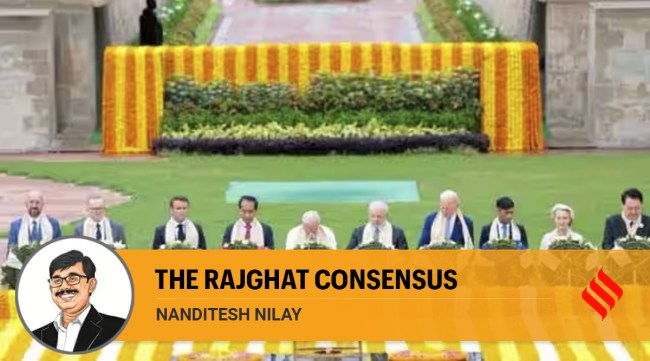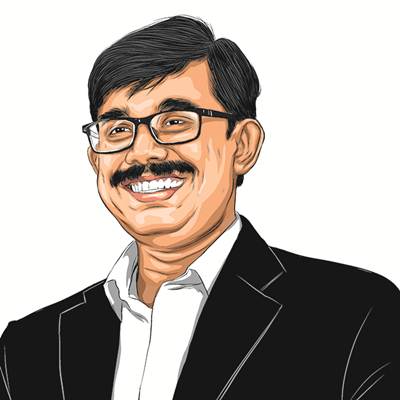Opinion How the Mahatma’s moral compass played a role in the G20’s New Delhi Declaration
Questions of prosperity, rights and responsibilities frame the challenges of today’s nation states. By attempting to build consensus on these issues, we carry forward his legacy
 There was another consensus that was powerful and resonant — The Rajghat Consensus, the agreement, among all leaders who stood in respectful silence, that Mahatma Gandhi’s values matter in 2023.
There was another consensus that was powerful and resonant — The Rajghat Consensus, the agreement, among all leaders who stood in respectful silence, that Mahatma Gandhi’s values matter in 2023.
The New Delhi G20 Declaration was the result of a remarkable diplomatic spadework led by India that got Russia, China and the West to agree to sign on a statement at a time when they agree on practically nothing. But there was another consensus the very next morning that was powerful and resonant — The Rajghat Consensus, the agreement, among all leaders who stood in respectful silence, that Mahatma Gandhi’s values matter in 2023, more than 150 years after he was born. That they matter today more than ever and that although these values are universal, there is also a unique, distinct Indian-ness about them.
Whether you prefer Bharat or India, the indisputable fact is that any discourse that attempts to reclaim our “civilisational ethos,” the Indian-ness of India or the Bharatiyata of Bharat, the principles enshrined in our ancient texts and scriptures, the Vedas and the Upanishads, including the Gita, all find their highest and most complete expression in the Mahatma’s values. In effect, the Mahatma is Bharat and Bharat is Mahatma, the Mahatma is India and India is Mahatma. Gandhi Jayanti is also our Bharat Jayanti.
The Mahatma would certainly not have approved of this equating the nation with the individual. For him, self-effacement was part of the cause itself. However, the best of Bharat or India, the best of our humanity is what is epitomised by the Mahatma. No celebration of Bharat or India is, therefore, complete without standing in tribute at Rajghat because not only did the Mahatma navigate us towards freedom, but his idea of the individual’s role in society, the frailty of what it is to be human, and the moral power of doubt, are the enduring principles that define leadership and public service.
Consider the big questions of today between the lines of the New Delhi Declaration: How do we work to spread prosperity? What’s the tension between fundamental rights and duties? How do we balance our need to consume versus the need to conserve? What responsibility do we have to the future? How do we learn to respect those who don’t pray to the same God or speak the same language? How do we blend modernity and our ancient ethos? How do we reduce our greed to ensure climate security and biodiversity? And the fundamental question: Who are we as a nation? Is being Indian about “I” or “We”? Who is “Us” and who is “Them”?
Each of these questions can have a million or a billion answers and the Mahatma’s experiments with truth give us the perfect compass to find our way. The Mahatma grappled with these questions, surrounded by self-doubt, accepting that he was flawed, that he was neither an ideal husband nor a father nor even a politician. That’s why his soft, tentative voice, finds an echo down the ages, in ahimsa, peace, truth, swaraj, sarvodaya, and even sarva shiksha.
French writer Romain Rolland talks about how the Mahatma’s manner was gentle and courteous even when dealing with adversaries. “He is modest and unassuming… Yet you feel his indomitable spirit. He makes no compromises and never tries to hide a mistake…nor is he afraid to admit having been wrong…he is happiest when, in meditative solitude, he can listen to the small voice within.”
This is what made the Mahatma the consensus builder — uncompromising in his integrity, yet deeply aware that he needed to bring warring sides together. No wonder then that PM Modi’s formulation, “This is not an era for war,” finds such an echo because it draws strongly from the Mahatma’s code of non-violence.
When India was celebrating her independence, the Mahatma was missing that day. Communal riots and mutual hatred had broken him and pushed him to the brink. He was searching for himself roaming through the heartland and trying to figure out his dharma of humanism. One day, a middle-aged man approached him and said: “I do not want to take the sin of your death on my head, please eat some bread.” And then suddenly he started crying, “If I die, then I will go to hell!” “Why?” the Mahatma asked. “Because I killed an eight-year-old boy.” “Why did you kill him?” “Because they killed my innocent child,” said the man crying.
The Mahatma thought for a while and then said, “I have a solution.” The man looked at him in surprise. “Find a boy of the same age who lost his parents in the riots and raise him like your own.” This was the Mahatma’s redefinition of truth.
Do we listen to him today? Do we accept our mistakes? Do we feel the pain of others? Do we find real followers in place of our virtual following? Today, we are more consumers than citizens. Our algorithms are designed to make us argue, and put each other down. This is where the Mahatma comes in, his non-violence was not only external action but internal too. It called for peace within. Manasa, vacha and karmana were always aligned and in rhythm with the Mahatma.
This is the Mahatma’s moral compass that brought all world leaders together last month in New Delhi. This is the compass that Albert Einstein, who best understood the connection between science and our humanity, described so well: “A leader of his people, unsupported by any outward authority, a politician whose successes rests not upon craft, not mastery of the technical devices, but simply on the convincing power of his personality, a victorious fighter, who had always scorned the use of force… a man who has confronted the brutality of Europe with the dignity of the simple human being… Generations to come..will scarce believe that such a one as this even in flesh and blood walked upon the earth.”
This Gandhi Jayanti, he does walk upon the earth — inside each one of us, pushing us to be our best as human beings, as Indians. We can afford to ignore Mohandas but not the Mahatma. He is us.
Nilay is the author of Being Good, Aaiye, Insaan Banaen & Ethikos. He teaches and trains courses on ethics, values and behaviour. He is also a doctoral fellow in Gandhian Studies from ICSSR




